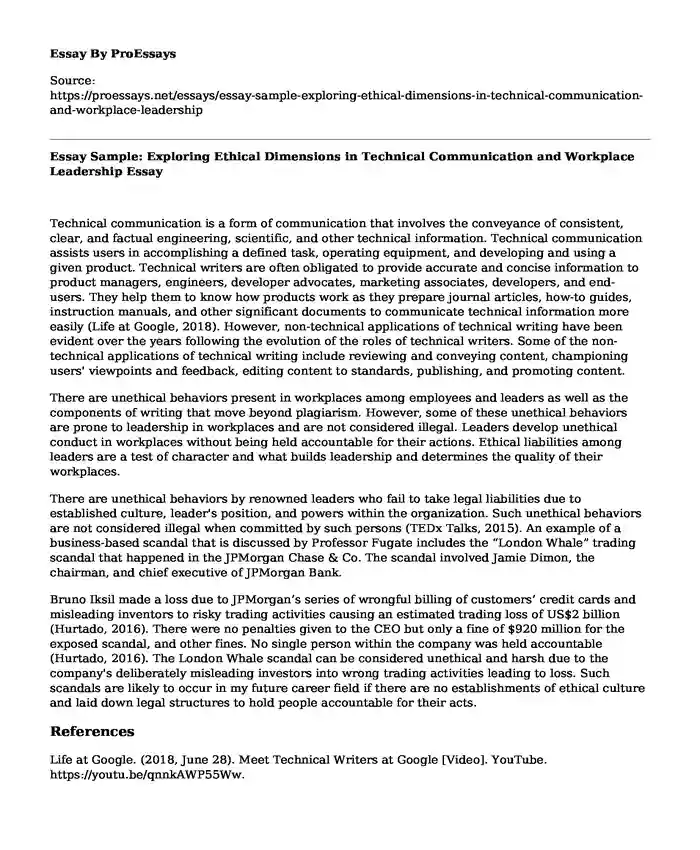Technical communication is a form of communication that involves the conveyance of consistent, clear, and factual engineering, scientific, and other technical information. Technical communication assists users in accomplishing a defined task, operating equipment, and developing and using a given product. Technical writers are often obligated to provide accurate and concise information to product managers, engineers, developer advocates, marketing associates, developers, and end-users. They help them to know how products work as they prepare journal articles, how-to guides, instruction manuals, and other significant documents to communicate technical information more easily (Life at Google, 2018). However, non-technical applications of technical writing have been evident over the years following the evolution of the roles of technical writers. Some of the non-technical applications of technical writing include reviewing and conveying content, championing users' viewpoints and feedback, editing content to standards, publishing, and promoting content.
There are unethical behaviors present in workplaces among employees and leaders as well as the components of writing that move beyond plagiarism. However, some of these unethical behaviors are prone to leadership in workplaces and are not considered illegal. Leaders develop unethical conduct in workplaces without being held accountable for their actions. Ethical liabilities among leaders are a test of character and what builds leadership and determines the quality of their workplaces.
There are unethical behaviors by renowned leaders who fail to take legal liabilities due to established culture, leader's position, and powers within the organization. Such unethical behaviors are not considered illegal when committed by such persons (TEDx Talks, 2015). An example of a business-based scandal that is discussed by Professor Fugate includes the “London Whale” trading scandal that happened in the JPMorgan Chase & Co. The scandal involved Jamie Dimon, the chairman, and chief executive of JPMorgan Bank.
Bruno Iksil made a loss due to JPMorgan’s series of wrongful billing of customers’ credit cards and misleading inventors to risky trading activities causing an estimated trading loss of US$2 billion (Hurtado, 2016). There were no penalties given to the CEO but only a fine of $920 million for the exposed scandal, and other fines. No single person within the company was held accountable (Hurtado, 2016). The London Whale scandal can be considered unethical and harsh due to the company's deliberately misleading investors into wrong trading activities leading to loss. Such scandals are likely to occur in my future career field if there are no establishments of ethical culture and laid down legal structures to hold people accountable for their acts.
References
Life at Google. (2018, June 28). Meet Technical Writers at Google [Video]. YouTube. https://youtu.be/qnnkAWP55Ww.
TEDx Talks. (2015, April 23). Legal vs. Ethical Liability: A Crisis of Leadership and Culture | Mel Fugate | TEDxSMU [Video]. YouTube. https://youtu.be/veXPk4Zeqtk.
Hurtado, P. (2016). The London Whale. Bloomberg.com. Retrieved 20 September 2020, from https://www.bloomberg.com/quicktake/the-london-whale.
Cite this page
Essay Sample: Exploring Ethical Dimensions in Technical Communication and Workplace Leadership. (2023, Dec 18). Retrieved from https://proessays.net/essays/essay-sample-exploring-ethical-dimensions-in-technical-communication-and-workplace-leadership
If you are the original author of this essay and no longer wish to have it published on the ProEssays website, please click below to request its removal:
- Essay on Significance of SHRM
- Essay Example on Government: A Powerful Social Institution Powering Society
- Paper Example on Volunteering: Benefits for Non-Profits and Society
- Leadership Decision Making: Northerner Plato vs Eastern Sun Tzu - Essay Sample
- Essay on Adapting to Ambiguity: Opportunities & Dangers of Tech & Revolutions
- Essay Sample on Emergency Response: Preparing Governments for Crisis
- Crisis Management Planning Case Study of Holiway Garden Resort & Spa in Bali and the Volcano Agung







